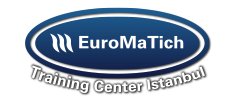INTRODUCTION
This highly participative Euro Matich Smart Cities, Management of Smart Urban Infrastructures training course reflects onto the current trend of implementing technology and smart solutions in the cities with the improvement of the citizens livelihood in mind.
The result of this trend is an increasing interest in the transitioning of cities towards smart cities. This is especially true as we see that interest expressed both by technology vendors and public authorities are following these trends. Smart technologies can provide immense opportunities for citizens and for service providers alike, the ICTs often act as disruptive innovators of urban infrastructure service provision, and this course is dedicated to the use of technologies and ICT for the creation of smart cities.
Participants attending the Euromatich Smart Cities, Management of Smart Urban Infrastructures training course will develop the following competencies:
Ability to understand opportunities related to smart urban infrastructures
Realise the challenges in implementation of smart urban infrastructures
Knowledge of urban infrastructure management
Experience of smart technologies for urban infrastructure management
Assurance of sustainability of energy, food, sanitation and mobility
TRAINING OBJECTIVES
This Euromatich Smart Cities, Management of Smart Urban Infrastructures training course aims to enable participants to achieve the following objectives:
Realisation of disruptive innovations influence in urban infrastructure
Identify urban infrastructure development strategies
Reduce problems and issues in transition to smart cities
Include the experiences from the course into your work
Potentials of legacy infrastructure incorporation
TRAINING OUTLINE
PROGRAMME OUTLINE
Day 1 – Legacy infrastructure and smart cities
- Existing infrastructure upgrade
- Smart City concept in terms of existing cities and towns
- Digitization
- Digitizing socio-economic systems of the cities
- Examples of improving existing cities
Day 2 – City energy demand
- Urban energy requirements
- Utilities in smart cities
- Energy as a service
- Risks in energy management
- Energy demand management in smart cities
Day 3 – Food and water management in smart cities
- Food production and delivery
- Sustainability of food provisions
- Water systems
- Water consumption
- Digitalization of food and water systems in smart cities
Day 4 – Smart city transportation and urban mobility
- Connectivity
- Urban transportation resources and needs
- Transportation management in smart cities
- Mobility and proximity
- Population mobility
Day 5 – Upgrade of existing cities into smart cities
- Building new smart city vs upgrading existing city
- Digitalization as a service
- Smart city services and management
- Voice of the citizen
- Examples of successful smart city intiatives


